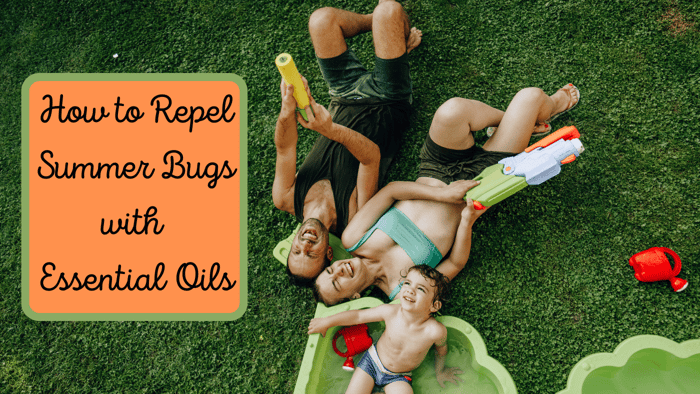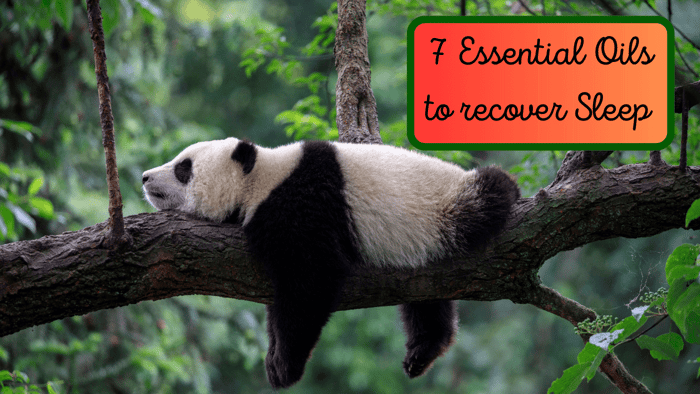Its the end of July as I'm writing this, which means the height of summer in many places. This time of year is great for fun and enjoyment: staying outside in the yard, opening up the windows to the warm air, or heading out to the beach to cool off.
However, a few things can seem to get in the way of this enjoyment, and bugs such as mosquitoes, flies, and gnats are close to the top of the list.
Yes, all these little critters are just going about their business and trying to live their life. But if ants infest your kitchen or mosquitoes keep you up at night with their buzzing and biting, its hard to enjoy the summer very much.
So what to do?
Commercial bug repellents have two big problems. First, they contain mystery chemicals that I personally do not want to inhale, apply to my skin, or spray around my house. Second, it often happens that these commercial products are not actually effective against many insects.
Besides, with the availability of essential oils, there’s no need to surround peoples bodies with dangerous chemicals, even if they happen to work effectively.
That's because essential oils are naturally bug repellent. It's no surprise really, since one of the main roles that essential oils serve in the plant kingdom is to protect plants from being invaded by insects. Thanks to the concentrated nature of essential oils, this can work wonderfully for us too.
Which essential oils repel insects? There are many that do, so here’s a condensed list to help get you started:
- Palo Santo 10% Dilute Ive been hearing from our customers about how well this works to repel mosquitoes. It seems that just a few drops applied to ankles, wrists and shoulders can work wonders. This is a holy wood that is also great in the diffuser, but you will need to get the undiluted version for that.
- Lavender famed for repelling mosquitoes, lavender does a good job on a range of other pests as well.
- Hinoki a variety of cypress from Japan, Hinoki is used for building temples because of its ability to repel insects as well as funguses and other intruders. Other kinds of cypress, pine, and cedar can also be effective against insects.
- Manuka repels a range of intruders, including mites, ants, and mosquitoes. Manuka is like Tea Tree, but more potent and with an aroma that seems to be more preferred.
- Peppermint different varieties of mint are effective against insects, but peppermint from the USA appears to be the strongest and most effective bug-repelling mint.
- Lemon- lemon essential oil contains d-limonene, a compound that is harmless to humans but deadly to small bugs and pests. (Do not use lemon essential oil topically if you will be heading out into the sun. It can make you sensitive to UV rays and cause a reaction similar to sunburn.)
- Tagetes- lethal to parasitic insects such as mosquitoes and fleas. It makes for a great all-around insect repellant. Plus this oil has a unique bright and citrusy aroma.
Once you have these essential oils, how should you use them to get rid of bugs? There are few different ways:
1. Diffuse them around your home. Use a few drops of the above oils in your diffuser to make your home smell great and to keep bugs away. I recommend nebulizing diffusers like the ones offered by Organic Aromas.
2. Use them topically on exposed skin. This is a great option in case you are heading out or to the beach or your garden.
Make sure to dilute the essential oils correctly before applying them to your skin (a 1-10% dilution should be sufficient click here to learn more about diluting essential oils). If applying essential oils to the whole body, I recommend no more than a 2.5% dilution for adults. If applying just to the ankles, wrists and shoulders, I use and recommend a 10% dilution. For children the dilution is much lower than adults. Please refer to this article to learn about safely applying essential oil to babies and children.
3. Make an essential oil bug spray. You can mix and match the oils above as you choose, but here's a basic recipe:
- 10 drops lavender essential oil
- 10 drops manuka essential oil
- 10 drops peppermint essential oil
- 2 Tbsp. of Witch hazel
- 8 oz water
Put it all in a spray bottle and spray away to protect yourself against bugs. Shake the mix before each use to help the essential oils disperse (essential oils do not dilute in water).
And what to do if you do get an insect bite?
A number of essential oils can reduce inflammation, relieve itching, and help small wounds heal more quickly. You can use a 2% dilution topically (click here to learn more about how to create a 2% dilution) to treat insect bites and stings. Of the oils listed above, lavender, tagetes, and manuka are particular effective for dealing with insect bites.
Have you tried out natural bug repellents? Id love to hear how it worked out for you. Please write a comment below and let me know. Mahalo!





